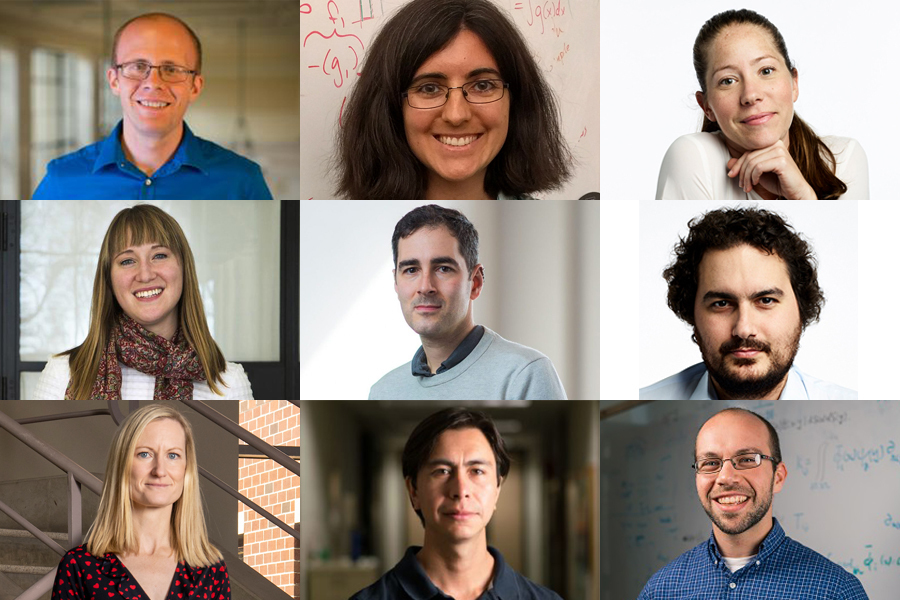
Nine faculty members, including at IMES, have been granted tenure in six units across MIT’s School of Engineering.
Mary Beth Gallagher | School of Engineering
In 2023, MIT granted tenure to nine faculty members across the School of Engineering. This year’s tenured engineers hold appointments in the departments of Biological Engineering, Civil and Environmental Engineering, Electrical Engineering and Computer Science (which reports jointly to the School of Engineering and MIT Schwarzman College of Computing), Materials Science and Engineering, and Mechanical Engineering, as well as the Institute for Medical Engineering and Science (IMES).
“I am truly inspired by this remarkable group of talented faculty members,” says Anantha Chandrakasan, dean of the School of Engineering and the Vannevar Bush Professor of Electrical Engineering and Computer Science. “The work they are doing, both in the lab and in the classroom, has made a tremendous impact at MIT and in the wider world. Their important research has applications in a diverse range of fields and industries. I am thrilled to congratulate them on the milestone of receiving tenure.”
This year’s newly tenured engineering faculty include:
- Michael Birnbaum, Class of 1956 Career Development Professor, associate professor of biological engineering, and faculty member at the Koch Institute for Integrative Cancer Research at MIT, works on understanding and manipulating immune recognition in cancer and infections. By using a variety of techniques to study the antigen recognition of T cells, he and his team aim to develop the next generation of immunotherapies.
- Tamara Broderick, associate professor of electrical engineering and computer science and member of the MIT Laboratory for Information and Decision Systems (LIDS) and the MIT Institute for Data, Systems, and Society (IDSS), works to provide fast and reliable quantification of uncertainty and robustness in modern data analysis procedures. Broderick and her research group develop data analysis tools with applications in fields, including genetics, economics, and assistive technology.
- Tal Cohen, associate professor of civil and environmental engineering and mechanical engineering, uses nonlinear solid mechanics to understand how materials behave under extreme conditions. By studying material instabilities, extreme dynamic loading conditions, growth, and chemical coupling, Cohen and her team combine theoretical models and experiments to shape our understanding of the observed phenomena and apply those insights in the design and characterization of material systems.
- Betar Gallant, Class of 1922 Career Development Professor and associate professor of mechanical engineering, develops advanced materials and chemistries for next-generation lithium-ion and lithium primary batteries and electrochemical carbon dioxide mitigation technologies. Her group’s work could lead to higher-energy and more sustainable batteries for electric vehicles, longer-lasting implantable medical devices, and new methods of carbon capture and conversion.
- Rafael Jaramillo, Thomas Lord Career Development Professor and associate professor of materials science and engineering, studies the synthesis, properties, and applications of electronic materials, particularly chalcogenide compound semiconductors. His work has applications in microelectronics, integrated photonics, telecommunications, and photovoltaics.
- Benedetto Marelli, associate professor of civil and environmental engineering, conducts research on the synthesis, assembly, and nanomanufacturing of structural biopolymers. He and his research team develop biomaterials for applications in agriculture, food security, and food safety.
- Ellen Roche, Latham Family Career Development Professor, an associate professor of mechanical engineering, and a core faculty of IMES, designs and develops implantable, biomimetic therapeutic devices and soft robotics that mechanically assist and repair tissue, deliver therapies, and enable enhanced preclinical testing. Her devices have a wide range of applications in human health, including cardiovascular and respiratory disease.
- Serguei Saavedra, associate professor of civil and environmental engineering, uses systems thinking, synthesis, and mathematical modeling to study the persistence of ecological systems under changing environments. His theoretical research is used to develop hypotheses and corroborate predictions of how ecological systems respond to climate change.
- Justin Solomon, associate professor of electrical engineering and computer science and member of the MIT Computer Science and Artificial Intelligence Laboratory and MIT Center for Computational Science and Engineering, works at the intersection of geometry, large-scale optimization, computer graphics, and machine learning. His research has diverse applications in machine learning, computer graphics, and geometric data processing.
* Originally published in MIT News.
